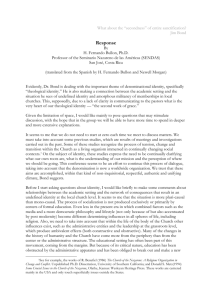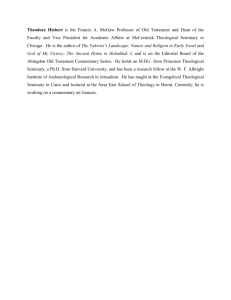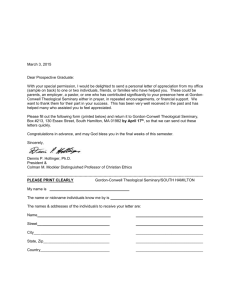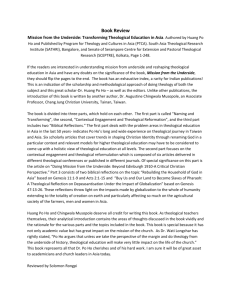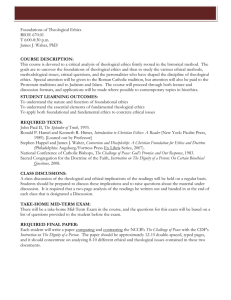Theological News
advertisement
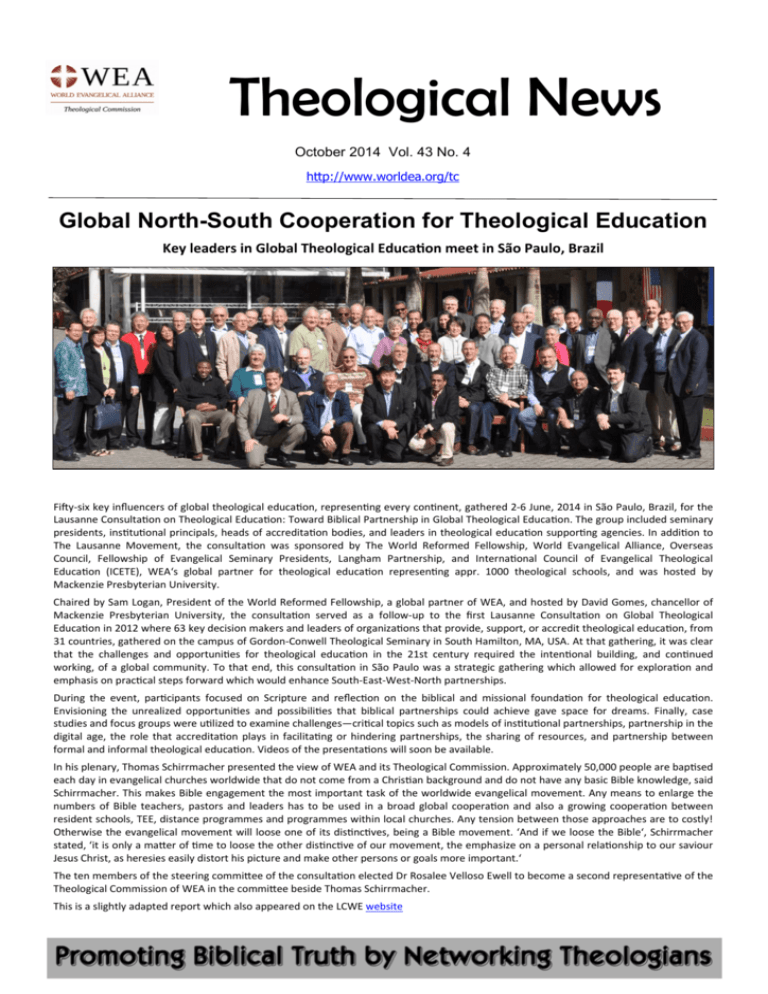
Theological News October 2014 Vol. 43 No. 4 http://www.worldea.org/tc Global North-South Cooperation for Theological Education Key leaders in Global Theological EducaƟon meet in São Paulo, Brazil Fi y‐six key influencers of global theological educa on, represen ng every con nent, gathered 2‐6 June, 2014 in São Paulo, Brazil, for the Lausanne Consulta on on Theological Educa on: Toward Biblical Partnership in Global Theological Educa on. The group included seminary presidents, ins tu onal principals, heads of accredita on bodies, and leaders in theological educa on suppor ng agencies. In addi on to The Lausanne Movement, the consulta on was sponsored by The World Reformed Fellowship, World Evangelical Alliance, Overseas Council, Fellowship of Evangelical Seminary Presidents, Langham Partnership, and Interna onal Council of Evangelical Theological Educa on (ICETE), WEA‘s global partner for theological educa on represen ng appr. 1000 theological schools, and was hosted by Mackenzie Presbyterian University. Chaired by Sam Logan, President of the World Reformed Fellowship, a global partner of WEA, and hosted by David Gomes, chancellor of Mackenzie Presbyterian University, the consulta on served as a follow‐up to the first Lausanne Consulta on on Global Theological Educa on in 2012 where 63 key decision makers and leaders of organiza ons that provide, support, or accredit theological educa on, from 31 countries, gathered on the campus of Gordon‐Conwell Theological Seminary in South Hamilton, MA, USA. At that gathering, it was clear that the challenges and opportuni es for theological educa on in the 21st century required the inten onal building, and con nued working, of a global community. To that end, this consulta on in São Paulo was a strategic gathering which allowed for explora on and emphasis on prac cal steps forward which would enhance South‐East‐West‐North partnerships. During the event, par cipants focused on Scripture and reflec on on the biblical and missional founda on for theological educa on. Envisioning the unrealized opportuni es and possibili es that biblical partnerships could achieve gave space for dreams. Finally, case studies and focus groups were u lized to examine challenges—cri cal topics such as models of ins tu onal partnerships, partnership in the digital age, the role that accredita on plays in facilita ng or hindering partnerships, the sharing of resources, and partnership between formal and informal theological educa on. Videos of the presenta ons will soon be available. In his plenary, Thomas Schirrmacher presented the view of WEA and its Theological Commission. Approximately 50,000 people are bap sed each day in evangelical churches worldwide that do not come from a Chris an background and do not have any basic Bible knowledge, said Schirrmacher. This makes Bible engagement the most important task of the worldwide evangelical movement. Any means to enlarge the numbers of Bible teachers, pastors and leaders has to be used in a broad global coopera on and also a growing coopera on between resident schools, TEE, distance programmes and programmes within local churches. Any tension between those approaches are to costly! Otherwise the evangelical movement will loose one of its dis nc ves, being a Bible movement. ‘And if we loose the Bible‘, Schirrmacher stated, ‘it is only a ma er of me to loose the other dis nc ve of our movement, the emphasize on a personal rela onship to our saviour Jesus Christ, as heresies easily distort his picture and make other persons or goals more important.‘ The ten members of the steering commi ee of the consulta on elected Dr Rosalee Velloso Ewell to become a second representa ve of the Theological Commission of WEA in the commi ee beside Thomas Schirrmacher. This is a slightly adapted report which also appeared on the LCWE website WEA TC Theological News Vol 43 No. 4 October 2014 Veteran Theological Leader Maintains Busy Program Rev Dr Bruce J Nicholls, the first Secretary of the WEA Theological Commission and promoter of many other similar ventures, now aged 87, is s ll ac ve travelling extensively in Asia to encourage theological understanding. In a newsle er of the Asia Research and Development Trust, based in Auckland NZ, Dr Nicholls reported on his travels in Indonesia and Korea during August 2014. He met with leaders of theological colleges and universi es in Jakarta. Later, he visited Bandung The‐ ological Seminary to help a team of Indonesian theologians develop the first major semester‐long distance educa on course on the Chris an worldview. In the middle of the month, he was in Seoul, Korea for a consulta on sponsored by the Asia Theological Associa on, an organiza on which he helped to form. The topic of the gathering was ‘The Lordship of Christ in 21st Century Asia.’ 8 plenary papers were presented, including one by Dr Nicholls on ‘Rethinking Christ’s Mis‐ sion in 21st Century Asia and the Middle East.’ These papers be published by ATA. Dr Nicholls said, ‘I am now devo ng my mature years to strengthening our Chris an engagement with contemporary Islam in Asia as it struggles to contain the radical movements of the Taliban, Muslim Brotherhood and al‐Qaeda.’ Later in the year he plans to visit Pakistan where he will speak at an interna onal conference on religious harmony, with a paper on the role of Chris ans in the way forward for peace and harmony in Asia and the Middle East. While in that country he will visit other col‐ leges and universi es. A second leg of this tour will be a visit to Kathmandu, Nepal, where the growing Chris an popula on, now around one million in 8000 small and large churches, suffers from a lack of trained pastoral leadership. According to Nicholls, ‘Theological Educa on by Extension, (TEE) with their correspondence courses, is the only way forward.’ In March 2014, Dr Nicholls completed an extensive tour which included visits to Thailand, Pakistan, Sri Lanka, Nepal and Bang‐ ladesh in his role as a senior advisor of the Asia Theological Associa on. During this tour, Dr Nicholls no ced many develop‐ ments, and said that ‘despite persecu on, Christ is establishing his kingdom on earth in these countries.’ As well as TEE, he said that on‐line theological educa on could help redress the lack of trained leaders amongst these churches. He also said that upgrading the level of basic training from BTh to MDiv was a necessity in many areas where a university degree is well respect‐ ed. He was pleased to note also that there had been a steady growth in new universi es under evangelical leadership with public accredita on. In addi on, many evangelical students are now studying in state universi es. Another development is the establishment of research centres. He said, ‘From ATA’s incep on in 1970, our vision has been to develop research centres. The first started in Seoul, under the leadership of Dr Han Chul‐Ha. Research is the greatest long‐term need for ATA‐related colleges, so they can produce good Bible commentaries, tracts and theological textbooks.’ Dr Nicholls, with his wife Kathleen (pictured) is based in Auckland NZ and may be contacted at brucejnicholls@gmail.com New Book Review Editor meets with TC in Bonn Theological Commission leaders met in Bonn, Germany on July 14, for discussion and planning. Members included Dr Thomas Schirrmacher, Executive Chair, Dr Rosalee Velloso Ewell, Executive Director, Dr David Parker, Executive Editor of Evangelical Review of Theology, Thomas K. Johnson, John Baxter‐Brown, and new Book Review Editor, Mr Michael Borowski. Important items on the agenda were the on‐going plans for the TC in the light of changes in WEA leadership, the TC’s websites and its publications especially Review of Theology. Internal changes to the publishing arrangements for the journal and the continuing growth in popularity of on‐line journals were factors in the discussion. Representation of the TC at various confer‐ ences and other events were also on the agenda, as was the extending of the links and personnel involved. Mr Michael Borowski, present for his first meeting, lives in Bielefeld, Germany with his wife Damaris who is an assistant pro‐ fessor at the University of Münster and a PhD candidate in linguistics. Michael holds degrees in Public Law (Münster) and Theology/Divinity (Martin Bucer Seminary and Columbia Int. University) and is currently working towards a Master’s degree (ETF, Leuven) and with plans for PhD work in the near future. His research interests focus on ecumenical and fundamental theology, political theory and religious freedom. He is Assistant Editor of the International Journal for Religious Freedom and works with Dr Schirrmacher in his role as Ambassador for Human Rights for the World Evangelical Alliance. He has also worked with Dr Tom Johnson in ‘Hope for Europe.’ He has served in a state social program for the unemployed for six years, works now in human resources and has lectured in this field at ter ary level, as in theology. In his role as Book Review Editor, Michael will be securing appropriate books from publishers and seeking qualified reviewers from the global evangelical community. The editorial policy of ERT is to provide coverage of significant books in the general fields of theology, ethics, church, missions and the like from around the world, with reviews of around 700 words by writers from as wide a range of backgrounds as possible. Offers of books for review and names of potential reviewers should be sent to Michael at michael.borowski@gmx.de 2 WEA TC Theological News Vol 43 No. 4 October 2014 ‘Bridging the Divide’: Insights, Trust and Encouragement The fourth gathering of the 'Bridging the Divide' (BtD) movement (see TN July 2014, p 3) was characterised by prayer, vigorous discussion and personal rela onships among those involved in ministry among Muslims. ‘Bridging the Divide’ is a group of mis‐ sionaries and scholars dedicated to bringing the gospel to the Muslim world. A report stated that 'more than twenty percent of par cipants this year were brothers and sisters from Muslim backgrounds, and all of us profited especially from their significant contribu on.' It was agreed that their presence 'expanded the range of our missiological insight' and that all were 'enriched by hearing their individual spiritual and missional journeys, varied self‐ understandings and their spirited interac on.' Some of the key topics included 'The Nature of Islam and its Sources of Authority,' and 'Taking the Long View: Church, Disciple‐ making and the Next Genera on.' It was no ceable that on this fourth occasion there was an 'increasing trust and mutual re‐ spect' amongst par cipants. One challenge facing the group was to use Scripture appropriately; there was an effort to 'iden fy and avoid some of the faulty assump ons that skew our understandings, interpreta ons and applica ons of Scripture.' It was also agreed that there was a need 'to be er translate the fruit of scholarship into prac cal relevance.' There was also careful examina on of the different perspec ves each ministry has on Muhammad and the Quran, and how these outlooks impact ministry prac ces. It was agreed that it was important 'to recognize that each local Muslim context car‐ ries a unique configura on of Muslim poli cal, cultural and religious authority.' Gatherings such as BtD provide valuable oppor‐ tuni es for a safe se ng where par cipants can 'hear and interact openly and honestly with first‐hand descrip ons of how new believers live and work out their iden es as the ekklesia (community of disciples of Jesus) in these diverse contexts.' There was a renewed sense of the importance of the 'ekklesia in the life of believers in the New Testament and throughout history' and its con nued value for spiritual growth today. There were reports of 'overcoming tensions, difficul es [and] suspi‐ cion' among ekklesias in some areas which provided encouragement and mo va on for the con nued ministry of the Bridge the Divide movement. For more informa on, visit h p://btdnetwork.org/ TC’s Environmental Ethics Book Updated after 10 Years Responsible Stewardship of God’s CreaƟon by Ken Gnanakan The newly revised edi on of Dr. Ken Gnanakan’s Responsible Stewardship of God’s CreaƟon is now available as volume 11 in the Global Issues book series. In light of ever increasing interna onal concerns about the environment, Gnanakan agreed to update his book which was enjoyed wide circula on when first published by the WEA Theological Commission in 2004. His efforts pick up themes that were first widely addressed in evangelical ethics by Francis Schaeffer in PolluƟon and the Death of Man (1970). The renewed publica on of Gnanakan’s book demonstrates that evangelical spokespeople have long been ad‐ dressing global concerns but that the needs now are greater than ever. This updated book, edited by Thomas K. Johnson, in‐ cludes a foreword by Dr. Chris Elisara, Director of the World Evangelical Alliance Crea on Care Task Force. Johnson noted that ‘Gnanakan is a master at integra ng his biblical convic ons with prac cal environmental knowledge. He freely moves from ar cula ng the rela onship between crea on and redemp on to discussing what this rela on means for crea onal stewardship today. This makes his study both very prac cal and very theological.’ Gnanakan is Chancellor of the ACTS Group of Ins tu ons (h p://actsgroup.org/)which he founded in 1979 aimed at total development through projects involving educa on, environment and health programs. Gnanakan was an ac ve member of the WEA Theological Commission for many years, serving as Vice‐Chair. (For a succinct statement of the theme of the book, see page 4.) Johnson added, ‘He interacts cri cally with many of the worldviews and religious beliefs that are influencing how our neigh‐ bors think about environmental responsibility while showing that his biblical convic ons lead to prac cal steps that are truly significant. The whole effort is intended to take crea on care out of the realm of poli cal controversy and into the realm of applied Chris an living.’ ‘This study illustrates the goal of the Global Issues series’ Johnson explained, ‘to show that the classical evangelical faith is a comprehensive worldview that successfully addresses the whole range of social and ethical problems of the twenty‐first cen‐ tury. For this purpose the Global Issues series has a number of authors from mul ple con nents, Europe, North America, Asia, and Africa. Star ng with human rights and leading through themes such as religious persecu on, responding to Islam and Islamic law, racism, human trafficking, religious extremism, and an introduc on to ethics oriented to business and public life, each book introduces a topic that should interest morally serious people. Every book demonstrates the integra on of faith and learning at the hand of serious scholars of our me and does so in such a way that readers get an introduc on to crucially important topics in just a few hours.’ This book, along with the several others in the series, is available as a free download, especially to serve the millions of Chris‐ ans who do not enjoy sufficient freedom of press to access printed books but do have the internet. For a free PDF copy of the book, visit h p://www.bucer.org/resources/details/responsible‐stewardship‐of‐gods‐crea on.html. 3 WEA TC Theological News Vol 43 No. 4 October 2014 The Environment—Should Christians be Concerned? By Ken Gnanakan Responsible Stewardship of God’s CreaƟon (WEA Global Issues Series, No 11, edited by Thomas K Johnson, 2013, p 16f) (See arƟcle page 3) As we read and recognize the intensity of the environmental crisis, a valid question that continues to confront us is – Should we be concerned? Perhaps it could be asked – why should we be concerned? Let us make one clarification before we attempt to answer this question. We are not talking here about the environmentalism, as proposed by the Earth Day followers. The kind of environmentalism that originated in the late 60s and early 70s basically represented an attack on development and the very ideals of Western civilization. It was even an indictment on the biblical doctrine of creation. The various philosophies opposed science, technology and economic development, and thereby challenged our industrial/ technological society. It regarded all human productivity and progress as an intrusion on the sanctity of nature and on the “rights” of animals. While this form of environmentalism may have been justified in its assault on Western consumerist culture, it was not right in the way it attacked every aspect of development and human progress. Therefore, when we speak here of “environmental concern and action,” it has to do with a more holistic response to the devastation we see today and a realistic approach to modern-day issues. Human carelessness, irresponsibility, greed, and waste are fundamental issues and have to be addressed. So, to the question – Should Christians be concerned? The answer is “Definitely!” There is room for a committed and concerted Christian response to remedy the disease that threatens our environment. Indeed, the aim of this study is to help in bringing about an eco-conscious Christian community. One of the main reasons for engaging in environmental action is that we as Christians are committed to the Creator God. This means that our environmental action should not merely demonstrate our human concern and care for the world, but should also be an essential response for our belief in this Creator. There are two major reasons for involving ourselves in the study of the environment and taking positive action towards its protection. Firstly, we need to correct the negative impression that some have of the Christian doctrine of creation. The doctrine of creation has been attacked for being the root cause for the environmental devastation that threatens us. Lynn White Jr., in his often-quoted article written in 1967, accused Christianity of being the most anthropocentric, i.e. human-centered, religion. The problem that White points to is largely derived from a particular interpretation of Genesis 1:28. God commands man to “rule” and have “dominion” and this is said to have led to an arrogant exploitation of nature. These texts have received increasing attention recently, and renewed attempts have been made to understand their meaning within the right context. But the onus rests heavily on us to correct any such false impressions. Secondly, and positively, there is the biblical mandate for us to be stewards of God’s creation. The crisis we face has to do with the overuse, or even misuse of our resources. We believe in a God who created heaven and earth and accept that this same God has entrusted us with the management and care of His creation. Hence, we will need to demonstrate a greater sense of responsibility. It is important that we assume the role of stewards seriously. We are not only accountable to God, as stewards of His creation, but must also demonstrate a responsibility towards our fellow human beings. Unfortunately, rather than using and managing the resources of our environment wisely, we have carelessly squandered them, taking it for granted that they will be endlessly available for our selfish consumption. God will provide, we assure ourselves, or very naively we proclaim that God will eventually give us plenty in heaven. We need to recognize the dire consequences here and now if we do not act immediately. A careful look at the Bible will reveal that ecological and environmental concerns are very much central to its message. The Word of God starts with the glorious account of God’s creation. God promised the best of created things to the people he made to be his own. The prophets looked forward to a renewed creation, the new heavens and the new earth. Jesus displayed a very positive attitude to all that was around him. Paul spoke about creation groaning for redemption, just as much as human beings groan for theirs. The final book, Revelation, concludes with a glowing description of the new heavens and the new earth, a glorious continuity of what God has already done for the world. And all this calls for an active engagement in protecting the environment, as responsible stewards of God’s creation. WEA Theological News Personal Subscription: Voluntary donation US$15 for 2 years Libraries/Institutions using a Commercial Subscription Service US$15 per annum Address for News and Subscriptions: WEA Theological News, Friedrichstr. 38, 53111 Bonn, Germany Email: chair_tc@worldea.org ISSN 0260-3705 Published quarterly by WEA Theological Commission Chairman: Dr Thomas Schirrmacher Executive Director: Dr Rosalee Velloso Ewell Vice-Chair: Dr James Nkansah-Obrempong Editor: Dr David Parker 4
